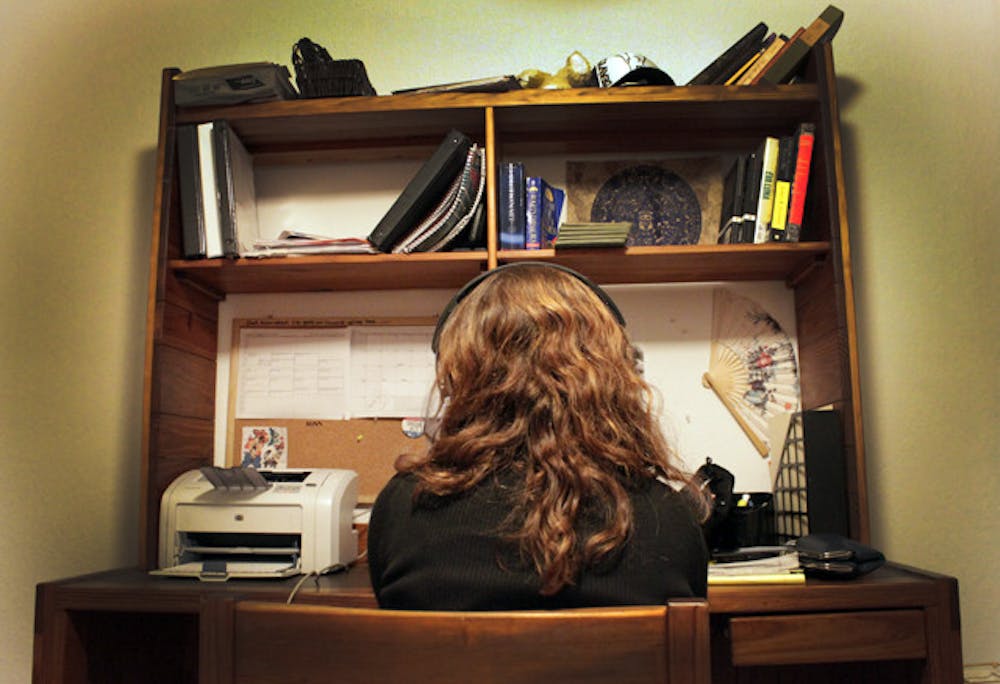She’s the girl you see on the bus every morning, hunched over a book, scribbling answers to math problems, listening to music with big headphones.
As the music plays, she stays still, always looking down.
She’s the one sitting next to you in class, or the one across the table at lunch. At night, she’s one of many girls dancing away to the rhythm of Spanish music at the cramped dance clubs.
The girl, a 19-year-old college student whose identity is being withheld to protect her legally, has spent more than half of her life living in this country undocumented, moving through life carefully and quietly. In the eyes of the United States government, she doesn’t even exist.
Now, she seeks a few pieces of paper that will legitimize her being here. When she fills out a job application, she doesn’t want to stop at the box labeled Social Security. Above all, she wants a chance.
Her story is one of about 65,000 that arise each year. According to the National Immigration Law Center, this many undocumented youths — students who came to the country before their 16th birthdays — graduate from high school each year in the U.S.
They are the children of illegal immigrants.
They are kids who can’t get loans to go to college and can’t get legal jobs to support themselves once they leave home.
And they don’t have a legal way to earn citizenship.
The Development, Relief and Education for Alien Minors Act, or DREAM Act, could become law before the end of the year, as Congress convenes for the post-election session this week.
Or, it could die.
The act provides a path for children of illegal immigrants to earn citizenship if they go to college or serve in the military.
Local DREAM Act supporter Victoria Mena led a candlelight vigil Sunday night on the Bo Diddley Community Plaza, where about 30 supporters pledged their support on the eve of Congress’ reconvening.
Standing in a circle, candles lit, they used their cell phones to call the office of Sen. George LeMieux, the Republican senator from Florida.
“I’ve been waiting all my life to make this call,” one supporter said.
“Please, sir, support the DREAM Act,” another supporter said.
Senate Majority Leader Harry Reid won his re-election with the strong backing of Hispanic voters in Nevada two weeks ago. Before the shift of power comes, he promised to introduce the bill during his final session as majority leader. The act had been attached to a military spending bill earlier in the year when it stalled after it met a Republican-led filibuster in September.
Mena said she knows this is the last opportunity for the Democratic majority to give the bill life, and that after this, it could be a long time before another real chance comes again.
“There’s a sense of urgency,” she said.
More than anything, the girl had been excited to fly.
“I was fascinated with planes,” she said, thinking back to the 2000 trip that brought her to this country.
She knew her family had come to make a new home. Her friends in Argentina had thrown her three surprise going-away parties. They had made her a scrapbook packed with as many memories as 8-year-olds can have.
Her father, Mariano, her younger brother, Gian, and her mother, Veronica, had packed what they could of their lives and brought it to America.
Veronica kept telling her son and daughter to tell anyone who asked that they were coming for vacation.
“Just tell them that you’re coming here for Disney World,” she told them.
Standing in front of the immigration officer, Veronica spoke in quivering English.
“Disney. Disney. Disney,” she said, smiling and nodding.
The girl remembers hearing fear in her mother’s voice. She wouldn’t completely understand this until later.
“I had no idea, but I thought something was odd,” she said. “I was young and naive, but I wasn’t stupid.”
They passed through the gate as tourists with visas that were to expire in a few months.
Their vacation would last 10 years.
Editor's note: For the second installment of this story, click here.






